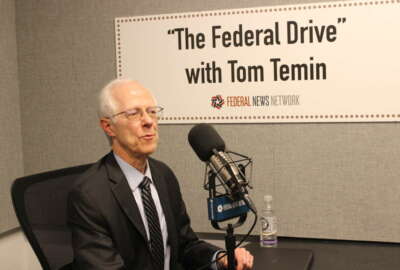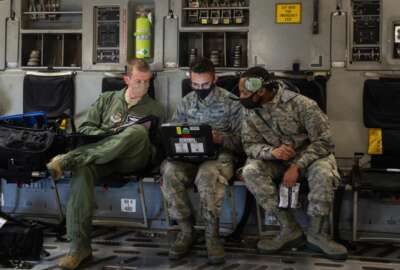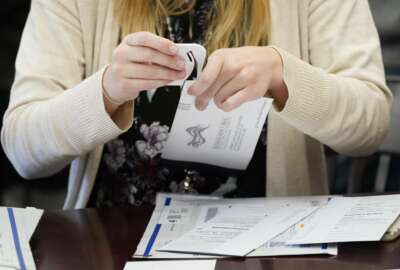
How the Federal Student Aid program has adjusted to the pandemic
The Education Department's student aid program is about to host an online conference for more than 14,000 people in the financial community.
Best listening experience is on Chrome, Firefox or Safari. Subscribe to Federal Drive’s daily audio interviews on Apple Podcasts or PodcastOne.
The Education Department’s student aid program is about to host an online conference for more than 14,000 people in the financial community. It can be that big because it’s online. With what’s new in student financial aid and what it needs to deliver, Federal Drive with Tom Temin turned to the Federal Student Aid program’s director of external events, Debra Byrne.
Interview transcript:
Tom Temin: Ms. Byrne, good to have you on.
Debra Byrne: Thank you. Pleasure to be here.
Tom Temin: So you’re reaching out to train people in the financial community. Who are these people? What kinds of places do they work? And what do they do in relation to the student aid program at the Education Department?
Debra Byrne: These are federal aid administrators from around the globe who deliver federal student aid to students every day.
Tom Temin: Well, are they banks, or what are they? I mean, what kinds of organizations are they?
Debra Byrne: Their at post secondary institutions, and their financial aid professionals.
Tom Temin: So they work for the colleges that are taking in the students that are working under federal aid — is that correct?
Debra Byrne: That’s correct.
Tom Temin: And what do they need to know?
Debra Byrne: Well, they need to know everything that departments doing. We are offering this year more than 40 breakout sessions, they’re going to hear about financial aid policy, COVID related impacts, and they’re gonna get lots of tools and resources for students, parents and borrowers. Lots of operational updates, including latest information about our Next Gen FSA initiative. And something for everyone at the conference this year.
Tom Temin: Tell us more about the Next Gen FSA initiative and how that works and what it will do to the whole program.
Debra Byrne: Well, it’s improving the way we deliver student aid. Last year, we announced their digital customer care, that now star mobile app, Aidan. And then this year, we’re going to roll out some new initiatives.
Tom Temin: And with respect to that conference, you mentioned that at least 14,000 people have signed up because it’s online. That’s bigger than you usually get in person, isn’t it?
Debra Byrne: Yes, it is. We normally get between 5,000 and 6,000 attendees. And this year, our registration is over 16,000 already, and counting.
Tom Temin: I guess, since I first learned about it, you’ve gained a couple of thousand more. So normally, in a regular year, if we ever have one, again, there’d be hotels and logistics and conference rooms and all of that jazz to deal with. And sounds like you could jettison a lot of the administrative associated with the conference this year.
Debra Byrne: That’s right. It’s just a different way of doing it. It has its own unique challenges, but we’re really excited about it. And it’s a free conference.
Tom Temin: Well that’s good. And what did you have to do to pivot in this way? And how long ago did you start the whole process?
Debra Byrne: We made the pivot from in person to virtual in June. And we worked with our partners to secure an event platform and plan the conference virtually.
Tom Temin: What platform did you pick? And why did you pick it?
Debra Byrne: We went through acquisitions, and we secured a platform that could host our event. It’s their unique platform that they built for us to deliver our conference.
Tom Temin: Okay. What about the courses and the sessions — and how’d you plan all that?
Debra Byrne: We worked with our conference steering committee internally to develop all of the session content. And then we worked with production company to record the content, and then we will air it December 1st through 4th.
Tom Temin: So that means you got to take out all the glitches.
Debra Byrne: We are really looking forward to our first ever virtual conference. I hope people can join, check out our conference website, FSA conferences.ed.gov and register and check out our event platform, it’s going to be a really exciting week.
Tom Temin: Yeah, these conferences normally run all day, because it’s online have you limited the length of the sessions, and the number of them per day? So as I guess bow to reality that people don’t sit online for eight hours a day.
Debra Byrne: That’s right, we tried to schedule our programming to best accommodate the content that we had to deliver, but also keeping that in mind about people’s lives. And the great thing about being virtual is if you can’t catch it live, which we hope you do — if you can’t catch it live, it’ll be available on demand right after the session airs, and then it will be available on the event platform for three more months after the program ends.
Tom Temin: And do you think you’ll ever go back to live after this?
Debra Byrne: Well, we hope so. We’re certainly planning on Atlanta for 2021.
Tom Temin: And in the meantime, do you have metrics or ways of measuring the level of engagement that people have with the online? How many people were at a session? How long they stay on, that kind of thing?
Debra Byrne: Yes, we do. We’re looking forward to seeing how the 16,000 and counting registrants translate into actual attendance. So we’re really excited about that.
Tom Temin: Debra Byrne is director of external events for the Federal Student Aid program at the Education Department. Thanks so much.
Debra Byrne: Thank you, Tom.
Copyright © 2025 Federal News Network. All rights reserved. This website is not intended for users located within the European Economic Area.
Tom Temin is host of the Federal Drive and has been providing insight on federal technology and management issues for more than 30 years.
Follow @tteminWFED





